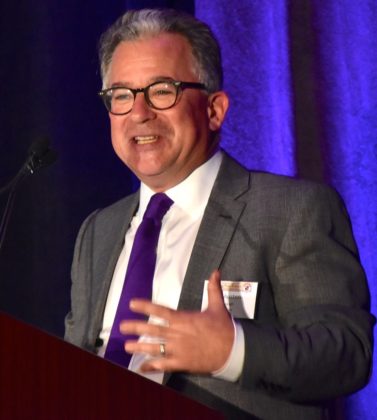
“I get invited to quite a few Pope Francis conferences and this has been absolutely, by far, the best one that I have been at for the sheer concentration of insight and quality of speakers, but also, the quality of those listening. I’ve really sensed you listening in these days.”
The quote is from Dr. Austen Ivereigh in his closing comments at “Discovering Pope Francis: Theological, Philosophical, Cultural and Spiritual Perspectives.” Ivereigh, a journalist and author of The Great Reformer, a biography of Pope Francis, was the opening presenter at the October 8-11 symposium. He was one of ten international scholars from around the world who spoke on various aspects of Pope Francis, including his formative experience as an Argentine and as a Jesuit, as well as the challenges of today’s papacy.
The symposium was hosted by Sacred Heart Seminary and School of Theology, an apostolate of the Priests of the Sacred Heart (Dehonians) and, in part, the brainchild of Archbishop Christophe Pierre (pictured top of page), Apostolic Nuncio to the United States. It was during the archbishop’s visit to Sacred Heart last year for the Dehon Lecture that the idea for a symposium on Pope Francis began to take shape.
In the archbishop’s introduction to the first full day he said that “Many theologians want everything to be simply black and white. However, Pope Francis is a man for whom in many matters discernment is essential…
“We must be able to live in tension between the poles and form a creative tension in openness to the Spirit to find the path forward to many of the world’s problems. This polarity affords us the opportunity to dialogue, and through dialogue, discover the truth… This symposium will be a major step in equipping the Church in the United States to understand, receive and defend the magisterium of Pope Francis and to meet the challenges of our day.”
So much material was covered during the symposium that it would be impossible to briefly summarize it in a single feature story. The following are just a few quotes from the presenters:
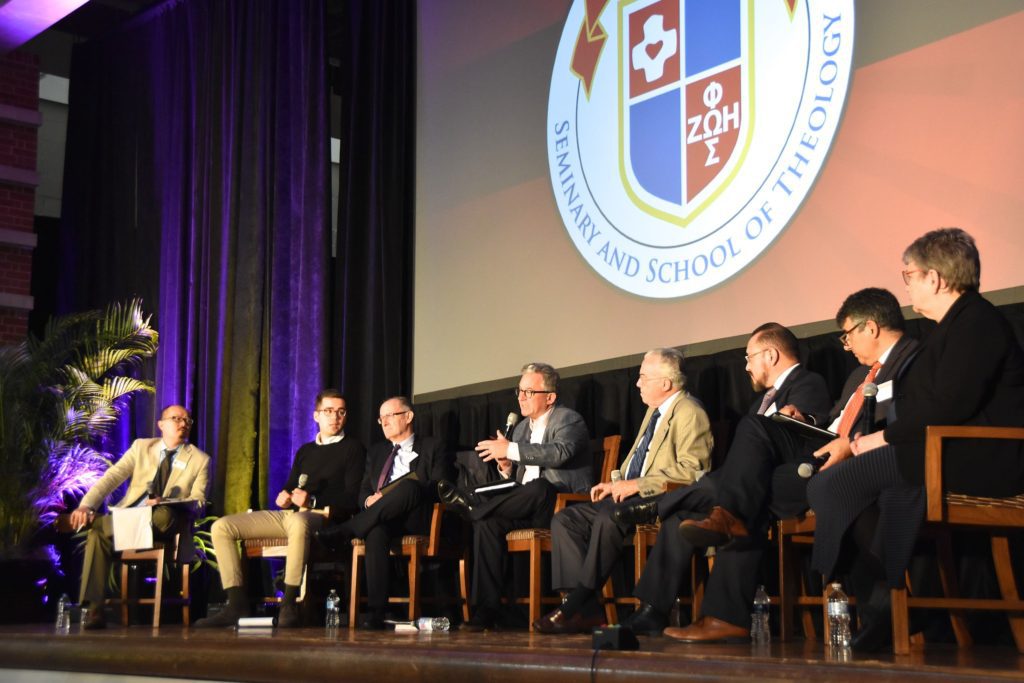
Joy is key
“Joy is absolutely key to evangelizing,” said Dr. Ivereigh in his presentation. “If people do not find that joy in our proclamation, they will never be captivated. It’s the joy that [Pope] Francis has never lost in spite of everything. He never lost the joy that he had the night of his election when he spent 20 minutes praying in the chapel before coming out on the balcony, when he said that he had an experience of freedom and peace that had never left him. That joy has stayed with him throughout. And it is the joy that he is inviting us to embrace.
“He told the Jesuits in 2016, but it applies to all of us: ‘The true work is to console the faithful people and through discernment help them so that the enemy of human nature does not rob us of our joy’
“The joy of evangelizing, the joy of the family. The joy of the Church, the joy of creation. Joy runs through the titles of all of his documents… It’s clear that he is trying to tell us something. The joy that comes from trusting God to guide us through the storm of our tribulation, the sweet joy of evangelizing a world in flux.”
Latin American influence
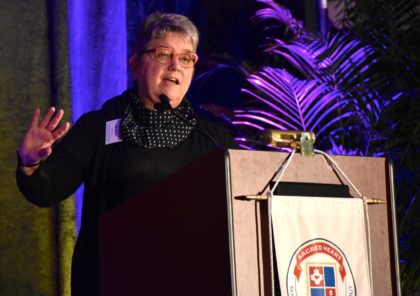
“We have to understand Pope Francis in terms of Latin America,” said Dr. Susan Wood, SCL, during her presentation, titled “Pope Francis and the Ecclesiology of De Lubac.” She is professor and chair of the Department of Theology at Marquette University.
“We know that the polarities in the Church mirror the polarities in society,” she continued. “This country is torn apart. So, what is the gift that we can bring to polar difference? The gift is to be able to hold that polarity. He [Pope Francis] is not trying to collapse either side of the argument into a winner and a loser, or some other synthesis. He is allowing it enrich the catholicity of the Church.
“To understand that, we have to put that in context. I think that we understand Pope John Paul II given his formation in Poland; we understand Pope Benedict in terms of a secularized Europe. We have to understand Pope Francis in terms of Latin America.”
A missionary outlook
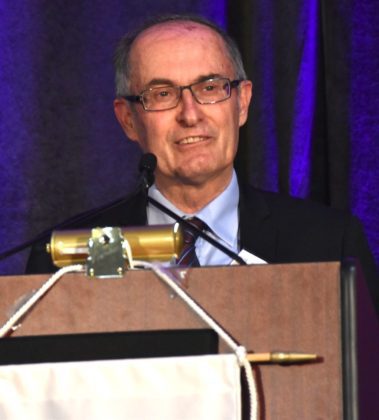
“To understand the Pope’s perspective, you have to have a missionary outlook,” said Dr. Massimo Borghesi, professor of Moral Philosophy at the University of Perugia (Italy) and the author of the internationally renowned biography of Pope Francis titled Jorg e Mario Bergoglio: Una biografia intellettuale.
“A Church that doesn’t live and understand the mission as part of the Spirit doesn’t understand Pope Francis,” Dr. Borghesi continued. “The pope’s outlook is to encounter, to meet everyone, to communicate Christ to them.
“Everyone should carefully read Evangeli Guadium [The Joy of the Gospel, Pope Francis’ 2013 apostolic exhortation]; it is Pope Francis’ manifesto. Everything about Pope Francis is there. You have to read it line by line to really understand who the Pope is. That is where you understand the missionary outlook that absolutely drives this entire pontificate.
“Remember that when he was young, Pope Francis wanted to go as a missionary to Japan. The mission guides and drives this disciple of St. Ignatius. He is devastated by a world that grows further away from Christ and he absolutely needs to find a way to communicate Christ to the world.”
Other presenters included Bishop Robert Barron (via video), auxiliary bishop of the Archdiocese of Los Angeles and the founder of Word on Fire Catholic Ministries; Fr. Stephen Bevans, SVD, Louis J. Luzbetak, SVD Professor of Mission and Culture, Emeritus, Catholic Theological Union; Dr. Rocco Buttiglione, a member of the Pontifical Academy of Social Sciences who holds the St. John Paul II Chair of Philosophy and History of European Institutions at the Lateran University in Rome; Dr. Guzmán Carriquiry, Vice President of the Pontifical Commission for Latin America; Dr. Peter Casarella, associate professor of theology at the University of Notre Dame; and Dr. Rodrigo Guerra Lopez, founder and researcher at the Center for Advanced Social Research, Mexico.
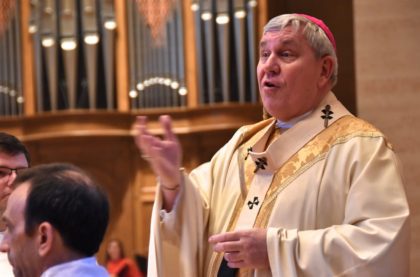
Archbishop Jerome Listecki of the Archdiocese of Milwaukee welcomed symposium participants for a Mass and reception at the Cathedral of St. John the Evangelist in downtown Milwaukee on October 10. Concelebrants included Bishop Jeffrey R. Haines and Bishop James T. Schuerman, auxiliary bishops of Milwaukee, as well as Archbishop Christophe Pierre, and several Dehonian priests. Bishop Haines also sat in on several sessions at the symposium.
Click here to view an online photo album from the conference.
Materials from the symposium, both written and video, are currently being assembled by SHSST for later distribution.

